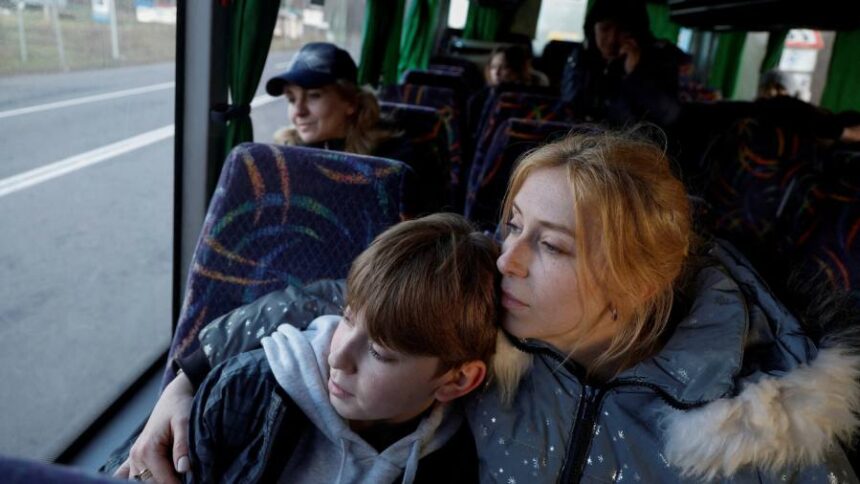Receive free War in Ukraine updates
We’ll send you a myFT Daily Digest email rounding up the latest War in Ukraine news every morning.
Saudi Arabia and Turkey are seeking to broker a deal to repatriate Ukrainian children taken to Russia and held in children’s homes or adopted by Russian families, according to four people familiar with the talks.
Officials in Kyiv and Moscow are compiling lists of the thousands of children moved to Russia since President Vladimir Putin’s invasion of Ukraine, as part of the mediation process, which has not been previously reported.
The highly sensitive talks, which have been ongoing for several months, indicate third parties are still looking for ways to agree compromises between Ukraine and Russia in the hope they can evolve into channels for potential peace talks aimed at ending the war.
Former Chelsea football club owner Roman Abramovich, who has previously mediated in peace negotiations, prisoner exchanges, and a grain deal as Putin’s unofficial emissary to Ukraine, is also involved in the discussions, according to two people familiar with the matter.
The need for mediators highlights the complexity of repatriating the relocated Ukrainian children, an issue that led the International Criminal Court to charge Putin with war crimes in March, along with his children’s rights commissioner Maria Lvova-Belova.
The issue is so contentious that Ukrainian and Russian officials have refused to speak to each other directly, unlike for some past prisoner swaps or ceasefire negotiations.
“There is no [direct] communication with the Russian side,” said Daria Herasymchuk, children’s rights commissioner in president Volodymyr Zelenskyy’s office. “Moreover, we are convinced that there can be no talks in this direction, because it is not a question of exchange of prisoners of war, these are civilians, these are children.”
Saudi Arabia raised displaced children at a meeting of officials from selected G20 members in Copenhagen in June as part of broader discussions about the need for third parties to talk to both Ukraine and Russia, according to a diplomat briefed on the talks.
The western countries gave Riyadh their blessing to continue mediating on the children and other issues including the grain deal, fears over contamination at a Russian-held nuclear power plant in southern Ukraine, and potential nuclear escalation, the diplomat said.
Turkey’s president Recep Tayyip Erdoğan has sought to carve out a role as a peacemaker by brokering the failed talks on an end to the war last year, as well as the grain deal and several prisoner exchanges.

Spokespeople for Putin, Zelenskyy, the Turkish government, and Abramovich did not respond to requests for comment. The Saudi government did not immediately respond to a request for comment.
Ukraine alleges Russia arranged the abductions of as many as 20,000 children with the explicit intent of erasing their Ukrainian identity. Yale’s Humanitarian Lab says at least 6,000 Ukrainian children have been moved to Russia, while Russia’s official figures count fewer still.
Neither side has kept centralised records of how many Ukrainian children have been relocated to Russia, while the differing circumstances in which they were taken make drawing up a full tally or working out where to send them difficult, the people said.
“There’s one situation when mom and dad are on Ukrainian territory. There’s another where there’s no mom and dad but there’s an aunt in Voronezh [southern Russia],” a person briefed on the talks said. “The goal is to count all the children to understand how many there are and then find the best solution for each child.”
Russia has used children in Russian-speaking areas of eastern Ukraine as propaganda tools to justify its invasion.
Some children brought to Russia have been enrolled in “patriotic” classes where they sing the Russian national anthem, are taught the Ukrainian nation never existed, and are told Moscow is fighting a war against “Nazism”.
Ukraine claims Russia is trying to eradicate the children’s Ukrainian identity, which Kyiv says is a form of genocide. “We are well aware that their actions are not chaotic, but they had a well-planned genocide policy towards us,” Herasymchuk said. “They are kidnapping children to replenish their dying nation.”
Another factor complicating the talks is the different ways the children arrived in Russia.
While some were forcibly taken in the early weeks of the invasion by Russian soldiers and publicly paraded, others were brought there by pro-Russian relatives or sent to Russian summer camps, then separated from their families when Ukraine retook their hometowns.
Though Russia has said it will let any child return to Ukraine if a legal guardian can physically reclaim them, parents have to do so on their own as Kyiv and Moscow refuse to engage directly on the issue.
Many of the Ukrainian parents lacked passports or the money to travel, making the roundabout route into Russia via Poland and Belarus or the Baltic States even more challenging. About 370 children — a small fraction of the total number that Kyiv says are stranded in Russia — have returned to Ukraine since being displaced.
The mediators hope Ukraine and Russia can both agree on a tally of the children so their families can reclaim them.
“This is too sensitive, no one trusts anyone. They need an independent body that will have the data of all the children and will be accepted by both countries,” a person involved in the talks said.
Additional reporting by Adam Samson in Ankara








